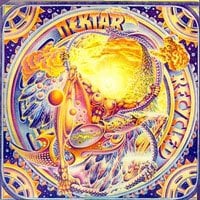/PAlogo_v2.gif) |
|
Post Reply 
|
Page <1 234 |
| Author | ||
XPEHOPE3KA 
Forum Newbie 
Joined: July 13 2007 Location: R Status: Offline Points: 29 |
 Posted: December 07 2010 at 07:55 Posted: December 07 2010 at 07:55 |
|
|
I'd like to post some remarks about the article in its current state. First of all, I'm the author of the Russian wikipedia article on progressive rock. The article isn't a translation of the English one, but instead is based on a book by Valery Syrov, a Russian music theorist. The English info about the book is here. AFAIK it's unavailable in English. And though he distinguishes between prog and art rock, I'm using in my comment my own interpretation of the issue with both his prog and his art rock being termed "prog". And in this book, written in 1997, he is using the very same idea of "prog-is-synthesis". I can even remember he probably doesn't attribute this idea to himself, but cites some Western scientists. He uses the idea only to define prog, but the definition of subgenres is straightforward. He doesn't restrain the genres to be fused with only to the top ones, which immediately eases the addition of the Heavy prog subgenre to the classification. However there is no objectively verifyable criterion of prog in the book. He says that prog "is a creative enrichment of rock music via a dialogue with other musical movements" and by "dialogue" he explicitly means something which is the inverse of "shallow copying, simplified reproduction or common blending of genres without attempting their synthesis and comprehension" - some kind of your #2 part of the criterion. Overall it's a funny read with great ideas like the use of "silence" (interchanging heavy with mellow music - presented in the book by waveform views of the audio files And there is also another independent comment on the synthesis hypothesis by the Arsenal (band legendary in USSR) frontman: "Progressive rock for the rock music is the same as fusion for the jazz music" (my own translation, as is, no warranty, etc). This IMO doesn't include any analogue to your #2 restriction. And now my own thoughts on the subject. Skip this paragraph if it bores you, but just a minor issue:
Actually I'd like to have a classification to support understanding of "another" identity. Sorry for the pun, I've just run out of words, but I'm talking about my own identity as a prog listener. What music traits I tend to like? What other albums might have such traits? This is what, say, last.fm tags are about. And this brings me to my own view of an ideal and thus impossible "classification". Just take the last.fm principle of tags instead of hierarchic classification (this kills the eclectic category, which is anyway just a bin for the yet unclassifiable), then decide to tag primarily albums (but also compositions and bands) and use only the objectively verifiable traits as tags. Some examples of "objectively verifiable traits" so that you see why I call it ideal: apart from easy tags like "from Sweden" or "contains a long track", there is a theoretical way to decide some more interesting traits. You can get an educated person to tell the time signatures and if they are changing, and also the musical modes, characteristic note patterns, etc. Another more theoretical way is to try to devise stochastic algorithms to analyze the music as a signal and to say if it contains all the above, or numerous character changes and if these changes are predictable (like in chorus-verse patters) or not. Same thing to see if there are heavy/mellow changes - the last is clearly doable. |
||
|
Just call me "X".
|
||
 |
||
Peter 
Special Collaborator 

Honorary Collaborator Joined: January 31 2004 Location: Canada Status: Offline Points: 9669 |
 Posted: December 07 2010 at 08:03 Posted: December 07 2010 at 08:03 |
|
|
You can't -- at least, at least, not for anyone besides yourself, because it is a highly subjective concept. Everyone here would agree that it's "good" and "better than other stuff," but those are subjective terms as well.
Try to nail it down any further and you get endless argument -- as you'll see if you spend any time here. It's a lousy way to classify music (though the term meant more for a few years after its inception).
|
||
|
"And, has thou slain the Jabberwock?
Come to my arms, my beamish boy! O frabjous day! Callooh! Callay!' He chortled in his joy. |
||
 |
||
David_D 
Forum Senior Member 
Joined: October 26 2010 Location: Copenhagen Status: Offline Points: 13530 |
 Posted: December 07 2010 at 16:58 Posted: December 07 2010 at 16:58 |
|
|
Hi XPEHOPE3KA.
Thanks a lot for your extensive remarks which I have following comments to:
1. The question of identity.
What I've been thinking about concerning identity, is the possibility of to a high degree feel as a Prog rocker and at the same time understand Prog as first and foremost syntheses of Rock and some other "main genres". If that could be possible, it would be less relevant whether the question is about, for instance, synthesis of Rock and Classical or of Rock and Jazz. If a Symphonic Prog fan for instance could indentify him self with a Jazz-Rock fan and feel as much respect for his taste of music as for his own, and think of them both as first and foremost Prog rockers then, it could be possible to have an identity as a Prog rocker independently of whether one was most fond of Symphonic, Jazz-rock or Progressive Metal.
2. About the classification.
First and foremost, the ambition of my wish for classification is not very high. I've just thought about having some tools, so, when even not being in possession of any further technical knowledge of music, one could nevetherless somehow analyze different types of music, see differences between them, changes over time and so on. Secondly, similarly to your ideal, I don't consider sub-genres as boxes, we can put albums in, but as tags or labels we can characterize albums with, and where it'll be quite often that we use more than one tag or label for each album. Due to such point of view, I prefer RateYourMusic's database structure, as it is mainly divided by bands and artists and it classify each album, than ProgArchives'.
By the way, I can read a little Russian as I originally come from Poland, but unfortunately not enough to read the russian book, you've told about, even it sounds very interesting. I'll be happy though to read the info about.
My idea of defining Progressive Rock by means of styles comes partly from Edward Macan's definition and partly from the wish to find a definition which could legitimize the including of at least several different sub-genres. Then I thought, why only "allow" a synthesis of Rock and Classical, like Macan does as a result of a historical analysis, and not Rock and some other "main genres"? Edited by David_D - December 08 2010 at 17:00 |
||
 |
||
TheOppenheimer 
Forum Senior Member 

Joined: May 29 2010 Location: Buenos Aires Status: Offline Points: 228 |
 Posted: January 28 2011 at 00:33 Posted: January 28 2011 at 00:33 |
|
|
The word "progressive" comes from PROGRESS.
|
||
|
////////////////////////////////////////////////////////////////////////////
A veces es cuestión de esperar, y tomarte en silencio. |
||
 |
||
moshkito 
Forum Senior Member 
Joined: January 04 2007 Location: Grok City Status: Offline Points: 16165 |
 Posted: January 28 2011 at 18:05 Posted: January 28 2011 at 18:05 |
|
|
Hi,
I actually can handle this part ... because it gives credit to a style that is quite prolific, but no one can say or do anything about it, and this board ... does not exactly have a place for them. It's hard to discuss Tangerine Dream here, when someone immediately says it's washing machine music, and they think that Rush is progressive and the rest is soap ... or prog!
List is missing the likes of Popol Vuh, Eberhard Schonner, Robert Schroeder and many others in Europe, that pretty much came out of the wood work like flies and many other critters at the time.
You're going to have to publish what you do, in order to invalidate the discussion (or even harrassment sometimes) of what is said here. What was developed here is the work of several people for many years and while you and I might not agree that it is perfect, and in many ways it does not reflect enough music and is sometimes very wishy washy and determined by a sound effect, is ... better than what is out there in many places ... which is nothing.
The problem is that all the study you are making is ... about nothing ... or as I love to give the example ... brainwashing -- a lot of the "progressive" music arose out of movements that came out of the time, the place, the "revolution" and many other anti-establishment things, and too many of these "definitions" are trying hard to make this jsut a musical this or that, and ignore the rest of the work and its inspiration ... and at that point, the whole ting crumbles ... and ProgArchives, does not have, that I have seen, a CHART, that would help show and explain the logic, and the definitions, which for me, right now ... are invisible and just a bunch of words -- not music, or art.
One of these days find the film "Isaac Stern goes to China" and then watch it ... and watch a little girl say that ... "the music is too industrialist" ... and I sat there ... and rewound the film ... yeah ... that's what it said. And we're falling into the same category of accepting what is told to us, including this board, even if it does not make sense ... but getting this discussion by some of these folks is a scary proposition, since, in the end, it would be about dismantling a lot of their work ... and since it's "their board" ... it's not gonna happen!
I don't think these folks are "wrong". I just think that sometimes trying to justify their opinions by using the words ... is weird, incomplete and sometimes ... crazy ... but if all you get is someone wanting to go find some more Rio ... fine with me ... but I'm going after the girls! Edited by moshkito - January 28 2011 at 19:28 |
||
|
Music is not just for listening ... it is for LIVING ... you got to feel it to know what's it about! Not being told!
www.pedrosena.com |
||
 |
||
rwhite 
Forum Newbie 
Joined: December 20 2008 Location: Los Angeles Status: Offline Points: 25 |
 Posted: January 30 2011 at 00:57 Posted: January 30 2011 at 00:57 |
|
|
Trying to exactly define a genre of music will always produce disagreements. That is because the borders of what separate the different genres (and prog is certainly no exception to this) are by nature fuzzy and probably shifting over time too. There will always be certain artists and music that seem to straddle the boundaries and are therefore harder to define. Still I believe genres (and even sub-genres) are a useful tool to help find the music you like since music overall still tends to cluster into various groups even though there are always many exceptions. Now I have bought albums by a good number of prog artists spanning most of the progressive sub-genres mentioned and, even though their approaches can be quite varied, there is definitely something that ties them together and separates them from the rest of the popular music world. That is, if I heard a sequence of songs by artists unknown to me and a few of them were prog, I believe that those would immediately stand out to me as such. Many (probably most) people who weren't aware of what prog was, might sense a difference in these songs too, but would probably only be able to tell you that the songs were unusual in a different sort of way. What is the difference? Well, that's been discussed many times here before, but what I hear is an overall greater complexity, a more ambitious level of composition and/or improvisation along with unusual keys, time signatures, scales, song structures, etc. None of this, of course, diminishes other kinds of music to me, many of which I enjoy immensely. There is endless room for continued variations in these genres too. Still, there is something pretty special about prog to me.
|
||
 |
||
moshkito 
Forum Senior Member 
Joined: January 04 2007 Location: Grok City Status: Offline Points: 16165 |
 Posted: February 02 2011 at 21:37 Posted: February 02 2011 at 21:37 |
|
|
Hi,
The only thing that is really wrong with almost ALL of the books on progressive music, is that they are not educated, and aware that there is a world out there and that the music means something beyond a note, or a chord.
And I find it offensive when someone is calling something "progressive" but they can not imagine that someone can create a new piece of music without their knoweldge or idea, or concerns. That academic point of view is highly offensive and is the "high class" point of view of a lot of music that the 20th century spent 75 years trying to break into smithreens, but some academic folks refuse to accept the loss in their war of words and worlds, and the majority of these "rock experts" are not studying each country and their cultural and artistic events to even have any idea of what the whole thing is about ... and separating the music by some musical bullpucky is not wise and basically only shows ... a total lack and concern for the wider view and wider development of the music and its environment ... in a world where the media and advertising became increasingly more open and influential ... you write something that ignores it all ...
It doesn't make sense, and is my "fight" on the PA stuff on a lot of bands ... that needs to get improved. But they not asking for help or have any interest in anything but rock music reviews as far as I can tell ... it's better than nothing, but sad in many ways ... the music can't improve when we don't care, and don't know how to color it better than ... "I like it"
|
||
|
Music is not just for listening ... it is for LIVING ... you got to feel it to know what's it about! Not being told!
www.pedrosena.com |
||
 |
||
Slartibartfast 
Collaborator 

Honorary Collaborator / In Memoriam Joined: April 29 2006 Location: Atlantais Status: Offline Points: 29625 |
 Posted: February 02 2011 at 22:13 Posted: February 02 2011 at 22:13 |
|
|
After a while definition and classification may no longer be important to you. Hopefully people won't get too hung up on that kind of thing. But if you have fun doing that, have at it.

|
||
|
Released date are often when it it impacted you but recorded dates are when it really happened...

|
||
 |
||
Jarvig 
Forum Newbie 

Joined: February 09 2011 Location: Denmark Status: Offline Points: 28 |
 Posted: February 09 2011 at 16:57 Posted: February 09 2011 at 16:57 |
|
In popular music we first had Rock & Roll (say Chuck Berry). Then Soft Pop (say early 60s american pop). Then Guitar Pop (say The Beatles). Then Rock (say Rolling Stones). We are now around 1966. Prog is not born yet. Because its time for summer of love. The psychedelic rock has taken the lead and bands such as The Beatles, The Rolling Stones, The Beach Boys and The Doors take rock to new and never seen places before. Already here we see that the most ambitious bands/artist try to make more/better/interesting/ambitious music than the pop and single format brings to the table. After psychedelic rock then a very broad genre is born and the subgenres have a lot in common. There are no real title for the genre. But we could call it Classic 70s Rock. The subgenres are: - Stadion Rock - Progressive rock - Album Rock - Art Rock - Avantgarde Rock - Glam Rock - Beginning Heavy Metal - Hard Rock - Blues Rock - Southern Rock What all subgenres under Classic 70s Rock shared were: - Rock was the basis - Singles and hits off cause to some extent important, but albums more important - Music have to be more than the "pop" in the 60s - Music can be more than "just music"....it can be artfull artistic statement about every aspect of life The subgenre Progressive Rock had the following features: - Incorporate other styles than just the standard blues progression, pop-standard and rock standard. Inspiration and incorporation on classical music, jazz and all kinds of world music very much needed. - Song structures much more advanced then just plain pop and rock - Playing live....a big believing in improvisations on stage - Many layers in the music - "Symphonic" sound much wanted. Because of the instruments available at the time we think of Classic Prog Rock in terms of Moog, Mini Moog, Analog Synths, Rhodes, Vox, Harmond Organ and Mellotron - Players almost allways very skilled in playing their instrument(s) - Soloing very common - Polyphonic structures normal - Concept albums very normal But even though all above were the directions then Rock and especially Classic 70s Rock were the basis for Progressive Rock. So far so good. But around 1975-76 everything changed. Punk was born. Punk was the "Anti Classic 70s Rock". Punk was not an enemy of Pop. Punk was an enemy of Classic 70s Rock. Punk believed that Classic 70s Rock and all subgenres of it was fake, phoney, over intellectual, too much engeneered/design/made in the brain, without real feelings, too complicated, not "the poor mans music", not real music and so on. I hate and love Punk. I hate it because their mission succeded. Classic Rock died for good, for ever. I hate because I simply dont like Punk music. But I love Punk for what it did to music as a whole. Classic Rock was becomming imploding in its own ambitions. Some of the things Punk hated about Classic Rock were true. And Punk killed all that. And because of that Classic 70s rock thus Progressive died. Off cause we had small subgenres of Progressive Rock - say Neo-Prog - after the big days Prog in the 70s.. But until mid-90s most of the prog was just attempts of making the old 70s Prog Rock in new clothes. Really, nothing new prog. The heritage (those I think were the good consequences) of Punk was - Indie pop/rock - Alternative rock - Grunge - Metal To me it was Metal who put prog on the map again (in the mid 90s). NOT Rock. Rock havent been played for 30 years. And though I never understand why prog never merged with Indie and/or alternative rock then that never happened and it was Metal who found inspiration in prog to make the second comming of Prog. Metal made something new with prog. Though not all modern prog have its roots in Metal, then Metal typical is the root in modern prog (as a genre, a development). To me Progressive Rock is the Classic 70s Prog. But today I think of the genre Prog as - those who have the roots in rock (and thus 70s classic rock and prog) - those who have the roots in metal - those who have the roots in electronic (the one "little subgenre I didnt touched, but all the stuff from Tangerine Dream, Kraftwerk and stuff like that) - those who have the roots in post rock (but strangly enough not indie or alt. rock) Though not sharing all then these subgenres typical have something in common: - They do not think about mainstream music and do not really make music to "break through" - Believe in the listener that he/she can and will appreciate more complicated (demanding) music than that of the mainstream music - Typical a believing among prog musicians and fans that their music is "better" and is "better taste" than other kind of music, especially mainstream music - Pushing the bounderies, that being - - Pushing sonic bounderies - - Pushing harmonic bounderies - - Pushing rhythmic bounderies - - Pushing compositional bounderies - - Pushing instrumential bounderies - - Pushing song structure bounderies - - Pushing historical connected conceptual bounderies The above is my definition of Progressive Music of today.
Edited by Jarvig - February 09 2011 at 17:02 |
||
 |
||
Jarvig 
Forum Newbie 

Joined: February 09 2011 Location: Denmark Status: Offline Points: 28 |
 Posted: February 09 2011 at 17:14 Posted: February 09 2011 at 17:14 |
|
|
One could ask: What about Jazz......or math prog?
Well to explain a bit how I would make the prog-subgenre-names then it would be. Prog is always the second last term. What the roots are are the last term. I dont believe that any prog have their roots in jazz. Because of that no subgeres ends on jazz. That have to do with what is in front of Prog.....the first term. Say you have a metal band who play prog and who really try to put jazz in their songs. Well, a band like that would - for me - be labled Subgenre: Jazz Prog Metal Metal is the root. Prog tells its a subgenre of Prog. Jazz tells that the direction is Jazz. or Subgenre: Symphonic Prog Post Rock. This a Post Rock band who are in the Prog genre. And the bands ambition/direction is to make this proggy post rock in the style/sound/performance symphonic.
|
||
 |
||
moshkito 
Forum Senior Member 
Joined: January 04 2007 Location: Grok City Status: Offline Points: 16165 |
 Posted: February 09 2011 at 18:19 Posted: February 09 2011 at 18:19 |
|
Damn ... how many beers did you need to get that done?
Even PA doesn't have it that well organized!
|
||
|
Music is not just for listening ... it is for LIVING ... you got to feel it to know what's it about! Not being told!
www.pedrosena.com |
||
 |
||
colorofmoney91 
Prog Reviewer 
Joined: March 16 2008 Location: Biosphere Status: Offline Points: 22774 |
 Posted: October 01 2011 at 21:13 Posted: October 01 2011 at 21:13 |
|
|
I consider progressive rock to be rock music that generally progresses within itself in any way. Vague is the way I like my definitions on subgenres of music.
Of course, I barely listen to progressive rock anymore; I tend to go for good music, whatever that may be for me at any given moment in time.
|
||
 |
||
Atavachron 
Special Collaborator 

Honorary Collaborator Joined: September 30 2006 Location: Pearland Status: Online Points: 64355 |
 Posted: October 02 2011 at 00:20 Posted: October 02 2011 at 00:20 |
|
happens to me frequently-- is that wrong? |
||
 |
||
skidzophonics 
Forum Newbie 
Joined: October 04 2011 Location: Australia Status: Offline Points: 1 |
 Posted: October 05 2011 at 07:16 Posted: October 05 2011 at 07:16 |
|
|
Awesome article \m/
|
||
|
If you're into Progressive Metal, feel free to check out my band Morphica - www.facebook.com/morphica
|
||
 |
||
Post Reply 
|
Page <1 234 |
| Forum Jump | Forum Permissions  You cannot post new topics in this forum You cannot reply to topics in this forum You cannot delete your posts in this forum You cannot edit your posts in this forum You cannot create polls in this forum You cannot vote in polls in this forum |